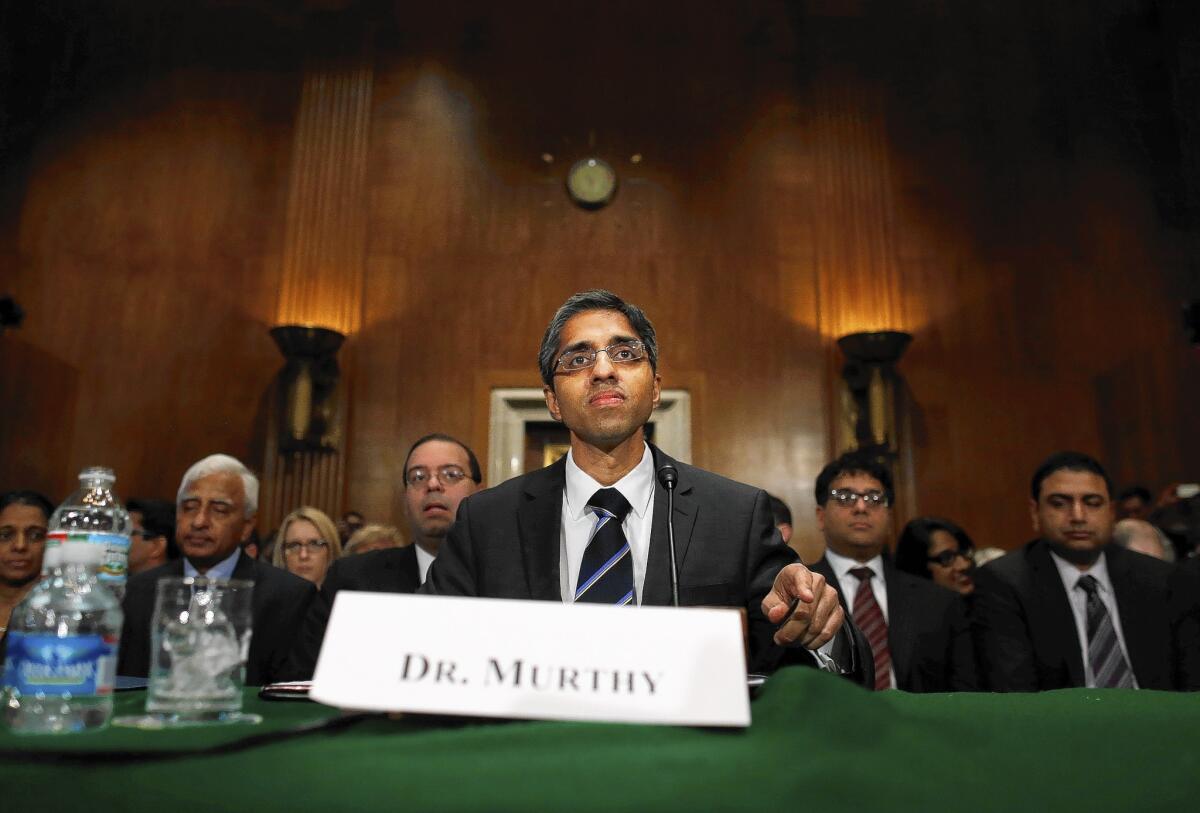NRA moves to new arena in fight over surgeon general

- Share via
WASHINGTON — In recent years, the National Rifle Assn. has stepped into fights over judicial nominees it views as weak on 2nd Amendment rights, but its decision to oppose a surgeon general nominee takes the powerful lobby into new territory, expanding its campaign to a post that has no direct power to regulate guns.
President Obama’s nominee, Dr. Vivek H. Murthy, a Massachusetts internist and former emergency room doctor, has called for more stringent gun laws. But he also testified at his Senate confirmation hearing last month that he would not use the surgeon general’s office as a bully pulpit to push for them.
The NRA, though, has pledged to block his appointment, arguing that it reflects the Obama administration’s intent to extend the gun control debate to new arenas.
“Gun owners in this country don’t have a guarantee that this surgeon general will not engage the gun issue,” NRA spokesman Andrew Arulanandam said.
The lobby’s new move could help keep the volatile issue alive in an election year when Democrats hope it will disappear because it could hurt moderate senators in competitive races.
Some political analysts who closely watch the influential organization suggest that the NRA’s stance also reflects an organization that needs such high-profile skirmishes to keep its more than 5 million members energized and that is increasingly pushed to compete with smaller firearm groups that are farther to the right.
Absolutist 2nd Amendment groups see the NRA as too conciliatory and are “nipping at their heels,” said Jim Kessler, a cofounder of the center-left think tank Third Way.
Gun Owners of America, once described by former Rep. Ron Paul (R-Texas) as “the only no-compromise gun lobby in Washington,” called on its 500,000 members last April to discourage the NRA from supporting bipartisan legislation in Congress that would have expanded background checks for gun buyers.
Erich Pratt, a spokesman, said his organization “would like to think” that it pressures the NRA into more ideological positions. Despite disagreements, he also said there was large overlap between the two organizations in advocacy and membership. “In a lot of fights, we are all on the same page,” he said.
Arulanandam declined to comment on whether the NRA feels pressure from these groups. “As far as these other pro-gun groups are concerned, we have more than 5 million dues-paying members, and, on any day, our plates are full,” he said.
The pressure on the NRA to keep active members mobilized is even more intense at a time when Democrats, facing tough reelection prospects, are not pushing gun laws, said David Karol, a political scientist at the University of Maryland in College Park.
“They look for what’s out there — where they can make a case — and this nomination was just a gift to them from the Obama administration,” Karol said. “I think what they have to worry about is being loved by their members and feared by politicians. And as long as they are able to do that, they’ll be fine.”
Arulanandam said NRA members appreciate the organization’s commitment to “fighting for their rights on multiple playing fields.”
The decision to engage in a fight over a surgeon general nominee could also reflect firearm advocates’ worries that gun control supporters will seek to cast the issue as a national health crisis, said Robert Spitzer, author of “The Politics of Gun Control” and a professor at the State University of New York at Cortland.
“There has been a long-standing dispute that the NRA has sort of ratcheted up with the public health and medical communities,” said Spitzer. He said the tension dates to the 1980s, when some physicians began to look at firearms as a public health question.
In a letter to Senate leadership last month, the executive director of the NRA’s political arm, Chris W. Cox, referred to a 2012 Twitter message in which Murthy wrote that “guns are a healthcare issue.”
Cox also cited a letter Murthy signed last year supporting a variety of firearm restrictions, including ammunition limits and a ban on “popular semiautomatic firearms.”
Murthy’s supporters argue that his views differ little from those of most Americans and the medical establishment. They also note that C. Everett Koop, President Reagan’s surgeon general, framed gun violence as a public health issue after he left government service.
Although Murthy said gun violence would not be a priority if he became surgeon general, the NRA’s Arulanandam said the organization must counter gun control advocates who are actively promoting their agenda on multiple battlefields, from state legislatures to the public health community.
With the NRA’s opposition and its promise to hold senators accountable for a vote to confirm Murthy, it’s unlikely that his nomination will come to a vote soon. White House Press Secretary Jay Carney said this week that the administration was rethinking its strategy for its surgeon general choice but did not plan to withdraw Murthy’s name.
For Senate Democrats who represent conservative states, a vote on a surgeon general appointment may not be worth the risk of drawing the organization’s ire. That could cost Murthy half a dozen or more Democratic votes.
“NRA’s bark is a lot worse than its bite,” Kessler said, “but they certainly have the potential to change an outcome and make life miserable, politically speaking, for anyone they put in their cross hairs.”
More to Read
Sign up for Essential California
The most important California stories and recommendations in your inbox every morning.
You may occasionally receive promotional content from the Los Angeles Times.










